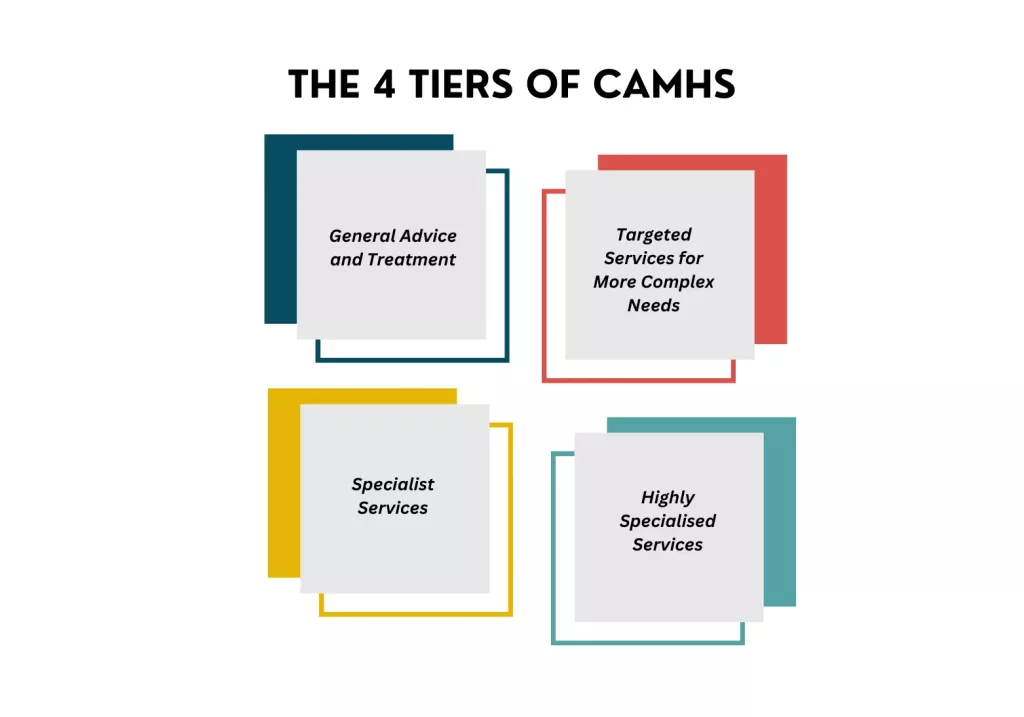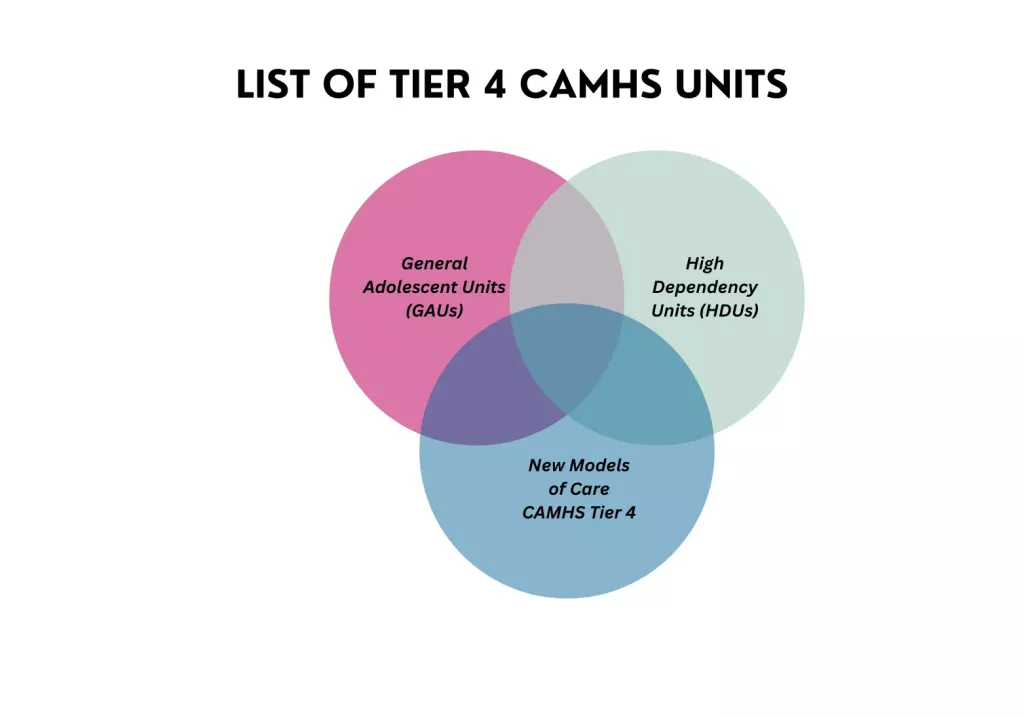What are the 4 Tiers of CAMHS?
CAMHS is the abbreviation of Child and Adolescent Mental Health Services, and the 4- tiers refers to an organised system in the UK to effectively deliver mental health services. Continue reading this blog to know more about 4-tiers of CAMHS.
Knowing about the ‘’4 tiers of CAMHS’’ might be beneficial in working with such a system as parents, caretakers or professionals. The following image will help you understand the way CAMHS work.
The 4 tiers of CAMHS
The 4 different tiers of child and teenage mental health services (CAMHS), are vital for helping young people with mental illnesses. Every level delivers specialised care depending on how severe a patient’s condition is. This way, it is guaranteed that all minors and adults get the suitable help for their requirements.
Read: Get Child Psychologist Expert Witness Reports.
Tier 1: General Advice and Treatment
The first out of 4 tiers of CAMHS is about general advice and treatment for kids and teenagers with their mental health. Children with mild problems can receive initial help from experts who may not specialise in mental health but can identify the issue.
That person might be a GP, teacher, school nurse, social worker or health visitor among others. They offer support in terms of advice and treatment, family guidance as well as referring them on if necessary to the relevant medical experts.

Tier 2: Targeted Services for More Complex Needs
Tier 2 services are designed for kids who need more detailed treatment referred from Tier 1. This includes CAMHS practitioners like counsellors, psychologists, and therapists who are more skilled but work in places such as schools and GP clinics. These experts make sure that mild or moderate issues like anxiety, depression and behavioural challenges receive appropriate attention at this level.
Tier 3: Specialist Services
The third level of the CAMHS is for minors that require specific and probably demanding service due to their complex or continuous psychiatric problems. This level includes child psychiatrists, clinical psychologists, nurses and occupational therapists. They may be based at designated CAMHS centres offering comprehensive assessments, treatment plans and interventions like Cognitive Behavioural Therapy (CBT) and family therapy.
Tier 4: Highly Specialised Services
All the 4 tiers of CAMHS have great significance; however CAMHS Tier 4 is the most essential and wide category. In terms of therapy, CAMHS Tier 4 is recommended for the children and teenagers with the worst mental health problems.
It encompasses services provided by specialised units such as hospitals where patients are admitted, day care centres or outpatient teams that deal with highly specific cases. Most of these institutions provide residential facilities for treatment, where young people are closely supervised by dedicated psychiatrists.
Furthermore, there are various units under this stage according to different regions.
List of tier 4 CAMHS Units
Out of many there are mainly 2 units of 4 tiers of Camhs which are based in the UK. Let’s explore the world of each unit.
General Adolescent Units (GAUs)
GUAs are a specialised unit of 4 tiers of Camhs with inpatient facilities. It is designed to provide intensive mental health care to adolescents aged 13-18 years. It provides a secure and controlled setting where adolescents can receive round-the-clock care and supervision.
Furthermore, GAUs is delivered by a multidisciplinary team of professionals, including child and adolescent psychiatrists. It also includes clinical psychologists and psychiatric nurses, social workers, occupational therapists, and educators.
GUAs offer a variety of therapy such as psychotherapy, CBT, Behavioural and group therapy. Adolescents in GAUs receive medical evaluations and treatment for any physical health issues that may accompany their mental health conditions.
Additionally, Education is an important part of GAUs. These units often have onsite education programs to ensure that young people continue their schooling during their stay.

High Dependency Units (HDUs)
Similar to GUAs, HUDs units in 4 tiers of CAMHS also provide care for young people with acute mental health that require constant supervision. These are commissioned by NHS England and include a variety of inpatient services.
These units cater to children and young people with severe learning disabilities, autism, and challenging behaviours, offering tailored interventions and support.
New Models of Care CAMHS Tier 4
New ways of caring for children and teens with serious mental health issues are making a big difference in CAMHS Tier 4. These new models of 4 tiers of camhs focus on making help more accessible and personalised. Instead of always relying on hospital stays, there are now more options for getting intensive support at home or in the community.
Teams can quickly respond to crises to avoid hospital admissions. Services are working together better, involving schools, social care, and health professionals to provide complete support.
Furthermore, technology is also playing a part, with online consultations and therapy making it easier for young people to get help no matter where they live.
Families are more involved in programs to support their child’s recovery. The aim of new models of 4 tiers of camhs is to spot problems early and provide support right away, preventing things from getting worse. Healthcare workers are getting better training to handle complex cases, and there’s more use of peer support from people who have been through similar experiences.
Finally, these new models focus on tracking progress to make sure treatments are really helping and constantly improving based on feedback from young people and their families.
Final Thoughts
The ‘’4 tier CAMHS’’ is a structured ladder for dealing with various mental health problems in children and teenagers. Every rung has been designed to provide the necessary level of intervention. Follow Concise Medico if you want more updates on such topics related to mental health care and if you need immediate medical assistance in medico-legal concerns like report writing contact us now!
What are the 4 Tiers of CAMHS?
CAMHS is the abbreviation of Child and Adolescent Mental Health Services, and the 4- tiers refers to an organised system in the UK to effectively deliver mental health services. Continue reading this blog to know more about 4-tiers of CAMHS.
Knowing about the ‘’4 tiers of CAMHS’’ might be beneficial in working with such a system as parents, caretakers or professionals. The following image will help you understand the way CAMHS work.
The 4 tiers of CAMHS
The 4 different tiers of child and teenage mental health services (CAMHS), are vital for helping young people with mental illnesses. Every level delivers specialised care depending on how severe a patient’s condition is. This way, it is guaranteed that all minors and adults get the suitable help for their requirements.
Read: Get Child Psychologist Expert Witness Reports.
Tier 1: General Advice and Treatment
The first out of 4 tiers of CAMHS is about general advice and treatment for kids and teenagers with their mental health. Children with mild problems can receive initial help from experts who may not specialise in mental health but can identify the issue.
That person might be a GP, teacher, school nurse, social worker or health visitor among others. They offer support in terms of advice and treatment, family guidance as well as referring them on if necessary to the relevant medical experts.

Tier 2: Targeted Services for More Complex Needs
Tier 2 services are designed for kids who need more detailed treatment referred from Tier 1. This includes CAMHS practitioners like counsellors, psychologists, and therapists who are more skilled but work in places such as schools and GP clinics. These experts make sure that mild or moderate issues like anxiety, depression and behavioural challenges receive appropriate attention at this level.
Tier 3: Specialist Services
The third level of the CAMHS is for minors that require specific and probably demanding service due to their complex or continuous psychiatric problems. This level includes child psychiatrists, clinical psychologists, nurses and occupational therapists. They may be based at designated CAMHS centres offering comprehensive assessments, treatment plans and interventions like Cognitive Behavioural Therapy (CBT) and family therapy.
Tier 4: Highly Specialised Services
All the 4 tiers of CAMHS have great significance; however CAMHS Tier 4 is the most essential and wide category. In terms of therapy, CAMHS Tier 4 is recommended for the children and teenagers with the worst mental health problems.
It encompasses services provided by specialised units such as hospitals where patients are admitted, day care centres or outpatient teams that deal with highly specific cases. Most of these institutions provide residential facilities for treatment, where young people are closely supervised by dedicated psychiatrists.
Furthermore, there are various units under this stage according to different regions.
List of tier 4 CAMHS Units
Out of many there are mainly 2 units of 4 tiers of Camhs which are based in the UK. Let’s explore the world of each unit.
General Adolescent Units (GAUs)
GUAs are a specialised unit of 4 tiers of Camhs with inpatient facilities. It is designed to provide intensive mental health care to adolescents aged 13-18 years. It provides a secure and controlled setting where adolescents can receive round-the-clock care and supervision.
Furthermore, GAUs is delivered by a multidisciplinary team of professionals, including child and adolescent psychiatrists. It also includes clinical psychologists and psychiatric nurses, social workers, occupational therapists, and educators.
GUAs offer a variety of therapy such as psychotherapy, CBT, Behavioural and group therapy. Adolescents in GAUs receive medical evaluations and treatment for any physical health issues that may accompany their mental health conditions.
Additionally, Education is an important part of GAUs. These units often have onsite education programs to ensure that young people continue their schooling during their stay.

High Dependency Units (HDUs)
Similar to GUAs, HUDs units in 4 tiers of CAMHS also provide care for young people with acute mental health that require constant supervision. These are commissioned by NHS England and include a variety of inpatient services.
These units cater to children and young people with severe learning disabilities, autism, and challenging behaviours, offering tailored interventions and support.
New Models of Care CAMHS Tier 4
New ways of caring for children and teens with serious mental health issues are making a big difference in CAMHS Tier 4. These new models of 4 tiers of camhs focus on making help more accessible and personalised. Instead of always relying on hospital stays, there are now more options for getting intensive support at home or in the community.
Teams can quickly respond to crises to avoid hospital admissions. Services are working together better, involving schools, social care, and health professionals to provide complete support.
Furthermore, technology is also playing a part, with online consultations and therapy making it easier for young people to get help no matter where they live.
Families are more involved in programs to support their child’s recovery. The aim of new models of 4 tiers of camhs is to spot problems early and provide support right away, preventing things from getting worse. Healthcare workers are getting better training to handle complex cases, and there’s more use of peer support from people who have been through similar experiences.
Finally, these new models focus on tracking progress to make sure treatments are really helping and constantly improving based on feedback from young people and their families.
Final Thoughts
The ‘’4 tier CAMHS’’ is a structured ladder for dealing with various mental health problems in children and teenagers. Every rung has been designed to provide the necessary level of intervention. Follow Concise Medico if you want more updates on such topics related to mental health care and if you need immediate medical assistance in medico-legal concerns like report writing contact us now!




